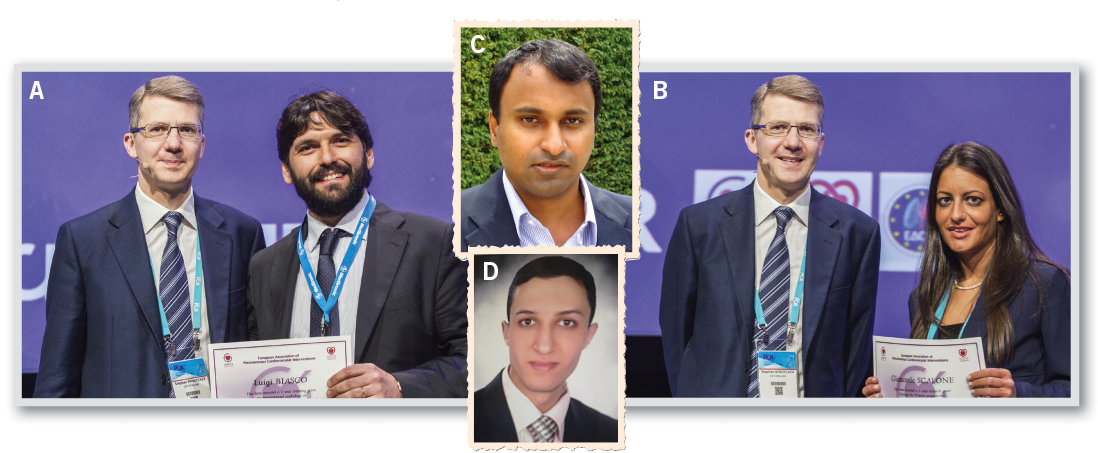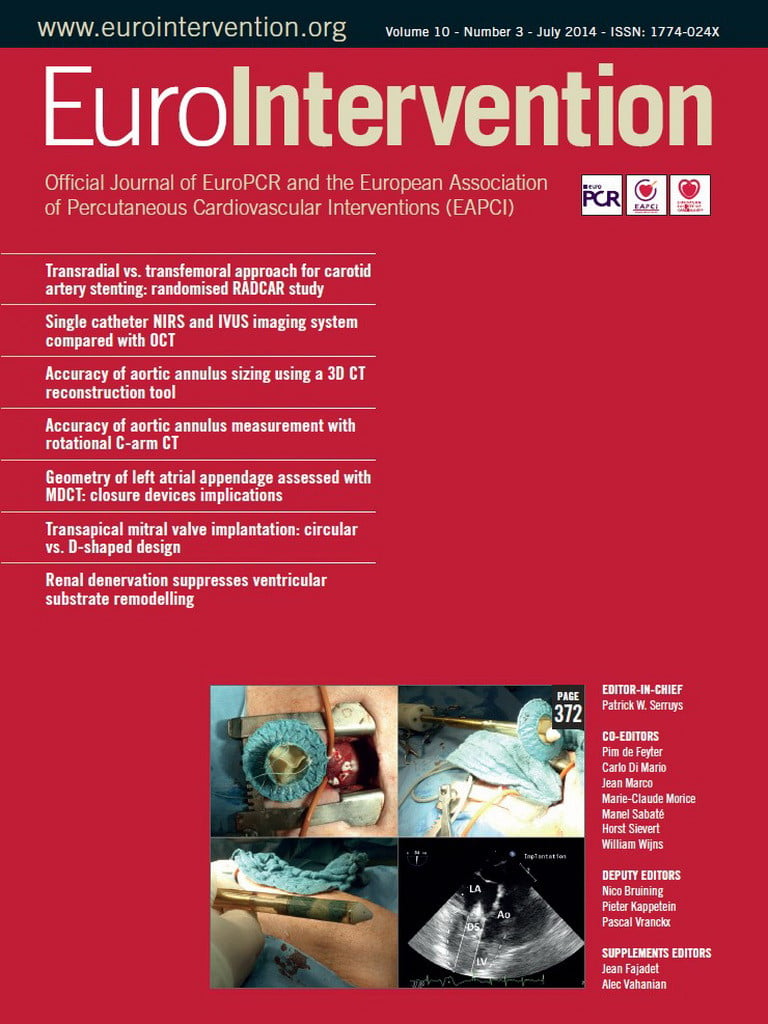For the first time the EAPCI renewed its executive board during EuroPCR 2014, the official annual meeting of the EAPCI. This was a unique occasion in the short history of our association where a constitutional change, overseen by my predecessor, Jean Fajadet, allowed the governing board to become official during our May meeting, and not during the European Society of Cardiology meeting in late summer, as was originally the case.
This is not a simple procedural change, but carries with it the significance that EuroPCR has for us: as the Course continues to grow, it does so not only in terms of size, but also in the relevance it has for our clinical practice. This year, EuroPCR had 12,257 attendees from throughout the world, but what makes this number even more impressive is that more than 2/3 of these attendees were practising physicians and health professionals.
Truly this is a meeting “by and for” the participants, and we only need to look at the number of abstracts – 1,052 submitted, with around 700 accepted for publication or presentation – to see the growing commitment on the part of our speciality to our annual gathering.
The EAPCI believes strongly in the concept of what William Wijns, Chair of PCR and a past president of the EAPCI, characterised in his opening remarks as “personalised medicine”. Of pivotal importance, personalised medicine is the delicate balancing act of acquired experience and clinical judgement in our era of evidenced-based medicine. At the very core of our association and the EuroPCR Course is this idea of sharing experience, an essential element in allowing the results of trials and registries to find their true place in our day-to-day practice. The application of rules and guidelines, and the interpretation of data both require our ability to understand the individual patient before us, and offer him or her the best treatment possible within the constraints and availabilities of the societies we live and work in today. This is the essence of personalised medicine and is an essential part of the practical approach to learning, exemplified by EuroPCR, focusing on current practice, as well as the evolution of our speciality and the transmission of knowledge.
A brief overview of EuroPCR
One of the oft-repeated words during EuroPCR was “innovation”, an idea and a concept that could be seen during the Course from several different standpoints. First, there was actual clinical innovation, as evidenced in the emerging mitral valve interventions, where catheter-based mitral valve replacement was shown to be feasible in humans for the first time using devices from several different companies. This, in many ways, is similar to the breakthrough for TAVI in 2002, and will have a tremendous impact on our practice in the future.
A second approach to innovation is to encourage innovation itself, in a sense, “priming the pump” by creating a dialogue that will facilitate the innovations of the future. With this in mind, EuroPCR organised the first, and very well received, PCR Innovation Day. Beginning with the premise of identifying unmet clinical needs in cardiovascular medicine, all the different players involved in innovation today – from inventors, to clinicians, to industrials – were brought together in order to exchange ideas and begin a dialogue to further advance our clinical practice as well as “promoting Europe as the place for innovation”.
Another aspect of innovation, which cannot be taken for granted, is the discipline necessary in validating emerging technologies and their subsequent clinical use. The necessity for the open and continued exchange of information to ensure the best bench to bedside techniques and treatments can be seen in the approach to renal denervation for the treatment of resistant hypertension, a field which has become a strong focus for members of our association. Today, it is understood that much work still needs to be done concerning these promising, but still new technologies: further identification of patient populations, better understanding of what constitutes a successful ablation procedure, relevant endpoints, ongoing refining of modalities and protocols and continued experience and subsequent studies whose results need to be carefully analysed and interpreted. Again, the exchange of clinical information and research that takes place in forums such as EuroPCR is critical. The very nature of personalised medicine requires that we find solutions for our patients, and do so in the most ethical and methodical way in order to move forward for the benefit of all.
It was this spirit of investigation and clinical expertise that was recognised by this year’s EuroPCR’s Ethica Award. The nature of our research and the clinicians among us who are instrumental in designing and performing our trials and registries are of the utmost importance. Adnan Kastrati, who was awarded the Ethica Award this year is an outstanding physician who personifies this blend of personalised medicine in an evidence-based world. Well known to you all for his prolific work with antithrombotic regimens and coronary stents, the ISAR trials, Adnan Kastrati is Professor of Cardiology and Head of Invasive Cardiology at the Deutsches Herzzentrum, Technische Universität, Munich, Germany, and a role model for young interventional cardiologists who wish to pursue a successful academic career in our field.
Our association and EuroPCR depend on the interaction with the community. EuroPCR’s Great Debate, whose topic this year was chosen by you through an online poll on PCRonline, exemplified this. Entitled “Primary PCI for STEMI: an emergency!”, it will also be the focus of an upcoming EuroIntervention supplement later this summer, with more information to follow.
As we look forward to these summer months, we are involved in the ongoing planning for the upcoming ESC meeting where the EAPCI plays an integral role in the creation of the interventional programme. To further underline the different work of our association in such activities as the ESC meeting and continuing education, in my next column for the August edition of EuroIntervention I will introduce the incoming executive board of our association, who they are, and the specific roles they will play in the future evolution of the EAPCI.
Another presidential criss-cross
In the August 2009 edition of EuroIntervention, William Wijns called his last column as President of the EAPCI “a presidential criss-cross”1. Today, we have arrived at another such “criss-cross”. Jean Fajadet, who led our association for almost three years as we moved towards the new planning, is now our Past President. In his first column as President in 2011, Jean explained that… “we have created a sustained and long-term vision about our association... a vision that is not limited to one year or two, but to the four or five years before us. It is essential during this period that –building on the past and the ongoing success of our partners in the ESC, EuroPCR and EuroIntervention– we expand the influence of our Association within Europe as well as internationally, increasing our membership, encouraging a more active participation by our members and becoming not the second largest of the subspecialty groups within the ESC, but the first. The EAPCI is well established. Now we must remain true to our foundations and show we are THE association for all interventional cardiologists committed to improving healthcare. Together we can truly accomplish more”².
We all continue in our dedication to these goals that Jean Fajadet set out for himself three years ago. His unrelenting commitment to the work of the EAPCI and his passionate leadership allowed us to evolve and mature into the second largest association of the ESC, and it is as evident today as it was three years ago that one of the strengths of our association resides in this balance we have between renewal and continuity, between innovation and practice.
The European Association of Percutaneous Cardiovascular Interventions (EAPCI), committed to maintaining a high standard of professional excellence among the entire interventional community at all stages of their career, is pleased to offer each year our dedicated training and research grants.
This year, the EAPCI offered a total of four fellowship grants in interventional cardiology thanks to financial support from AstraZeneca, Edwards Lifesciences and Medtronic. These awards are offered to medical graduates at any stage of their career within the field of interventional cardiology, but before they obtain a permanent, senior staff or consultant position. Providing an opportunity for a one-year specialised research or clinical training in an ESC member country other than the country of residence of the candidate, the awards also allow the successful candidate to contribute to the enhancement of their country’s academic standards upon their return to their home country as well as encouraging international exchanges and interactions.
This year, the EAPCI Fellowship Committee, chaired by Professors Michael Haude and Adam Witkowski reviewed 42 applications. From within this application pool, the four winners selected for the 2014 fellowship grants are:
John Jose from India obtained a fellowship at the Heart Center, Segeberger Kliniken GmbH, The Academic Teaching Hospital of the Universities of Kiel and Hamburg, Bad Segeberg in Germany under the supervision of Mohamed Abdel-Wahab. His specialised training topic is “Assessment of valve haemodynamics, regurgitation, ventricular remodeling and myocardial fibrosis following transcatheter aortic valve implantation with second generation devices as compared to surgical aortic valve replacement using cardiovascular magnetic resonance study”. This grant is supported by Medtronic.
Luigi Biasco from Italy has been granted a fellowship to work at the Rigshospitalet, Copenhagen University Hospital in Denmark under the supervision of Lars Sondergaard. His training will concern “Anaemia in TAVI patients, a possible indicator of poor prognosis?”. This grant is supported by Edwards Lifesciences.
Shady Elnaggar from Egypt received a fellowship to the University of Duisburg-Essen, West German Heart Center, Germany under the supervision of Raimund Erbel. The topic of his training is “Outcomes of SAPIEN 3 THV in comparison to Edwards SAPIEN XT THV: real world single centre experience”. This grant is supported by Edwards Lifesciences.
Giancarla Scalone from Italy was awarded a fellowship at the Hospital Clinic de Barcelona–ICT in Barcelona, Spain under the supervision of Manel Sabate. She will be looking at “Endothelial function assessment in sudden death patients treated by primary percutaneous coronary intervention and hypothermia”. This grant is supported by AstraZeneca.

Luigi Biasco (A) and Giancarla Scalone (B) each received their grant awards from the President of the EAPCI, Stephan Windecker during EuroPCR 2014. John Jose (C) and Shady Elnaggar (D) were unable to attend the ceremony.

